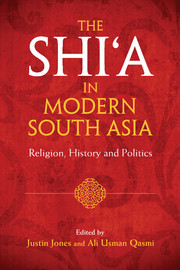Book contents
- Frontmatter
- Contents
- Preface
- Introduction
- 1 Faith Deployed for a New Shiʿi Polity in India
- 2 The Ismaʿili – Isna ʿAshari Divide Among the Khojas
- 3 Local Nodes of a Transnational Network
- 4 Shiʿism, Humanity and Revolution in Twentieth-century India
- 5 Universalising Aspirations
- 6 Muslims, Media and Mobility in the Indian Ocean Region
- 7 Shariʿa, Shiʿas and Chishtiya Revivalism
- 8 Third Wave Shiʿism
- Contributors
- Index
3 - Local Nodes of a Transnational Network
Published online by Cambridge University Press: 05 May 2015
- Frontmatter
- Contents
- Preface
- Introduction
- 1 Faith Deployed for a New Shiʿi Polity in India
- 2 The Ismaʿili – Isna ʿAshari Divide Among the Khojas
- 3 Local Nodes of a Transnational Network
- 4 Shiʿism, Humanity and Revolution in Twentieth-century India
- 5 Universalising Aspirations
- 6 Muslims, Media and Mobility in the Indian Ocean Region
- 7 Shariʿa, Shiʿas and Chishtiya Revivalism
- 8 Third Wave Shiʿism
- Contributors
- Index
Summary
The Islamic world, in the nineteenth and twentieth centuries, was forced to address new social and political exigencies as a result of imperialism and the increasing push of globalisation. India in many ways represented a microcosm of all these struggles. Although these new interactions propelled debates of reconfiguring and renegotiating ideas of identity, particularly amongst Muslims, they did not entirely subsume older networks as shall be demonstrated in this article. Instead, these new local and transnational networks built upon and expanded traditional links between centres of Muslim authority and peripheral areas, primarily through utilising existing hereditary structures and established lines of authority.
A considerable corpus of scholarship exists on Muslim thought, Islamic modernism and Muslim reformers in India. However, most of this has dealt with areas, issues and people from Sunni schools of thought. Sayyid Ahmad Khan, Maulana Mawdudi of the Jamaʿat-i Islami, Allamah Iqbal, Ashraf ʿAli Thanawi, the Deoband movement, the Nadwaʿt-ul ‘Ulama, the Ahl-i Hadith and Ahl-i Qur’ an movements and many other prominent organisations and people have been written about extensively. However, comparatively little work has been done on the sizeable Shiʿi community and particularly their ashraf (elite) and the role they played in finding a balance between Islam and nationalism and defining their own identities when faced with the social, economic and most importantly political exigencies of the time. Apart from Athar ʿAbbas Rizvi's rich yet broad historical work, Juan Cole's detailed study of the origins of north Indian Shiʿism in Iran and Iraq in the seventeenth and eighteenth centuries, and Justin Jones's timely work on the Shiʿa in colonial India, there has been very little focus on the prominent Shiʿi families of India. Indeed no work has been done on the Mahmudabad family.
Thus, this article analyses two recent generations of this particular leading Shiʿi family: Maharaja Muhammad ʿAli Muhammad Khan (1878–1931ce), henceforth referred to as the Maharaja, and Raja Muhammad Amir Ahmad Khan (1914–1973), henceforth referred to as the Raja.
- Type
- Chapter
- Information
- The Shi‘a in Modern South AsiaReligion, History and Politics, pp. 57 - 79Publisher: Cambridge University PressPrint publication year: 2015



